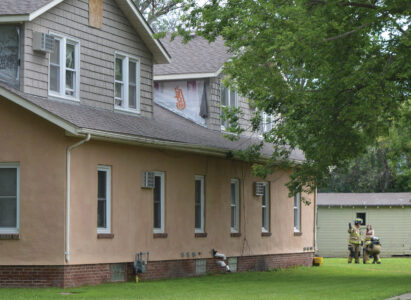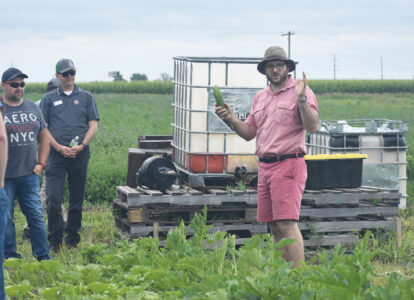Farming ‘a great life’ — but it has changed

Photo courtesy of David Schreurs David Schreurs and his wife, Kathy, held different jobs through the years while farming in Lincoln County.
Even though I grew up a “City Slicker” in Tyler, I spent a lot of time on farms, whether it was staying with my farming friends or throwing bales in the summertime. But I really didn’t know much about the actual farming. My thought as a teenager was that you plant in the spring, hope for rain in the summer, then harvest the crops in the fall and take them to the elevator to get paid.
Simple, right?
Well, that may have been somewhat true back in the 1950s and 1960s, but according to Dave Schreurs, a local farmer, things have changed dramatically since then. Everything from equipment, selling the crops, and fertilizer, to land prices, CRP and the futures market.
Schreurs, who farms east of Arco, says that even though the concept has basically remained the same, how you get there is quite a bit different. Like many farmers, he started out a farmer’s son.
“From early on, we had all kinds of livestock that included cattle, chickens and hogs, along with doing some dairy. Like most kids, we were expected to help out with the chores, from grinding feed, cleaning out barns, and taking care of the animals. When I was eight or nine, my dad came to me and told me he would give me a quarter a day if you will get up in the morning and help him milk the cows. That was pretty good money in the 50s, so I jumped on that,” he said. “But about two years later, we lost 80 acres that we were renting, so since we rented all of the rest of the land, there wasn’t really enough left with the 160 acres to support the dairy portion, so my Dad decided to get out of the dairy.”
“From there, we went into beef and hog farming, and we did that until after I graduated from high school in 1969,” Schreurs said. “My dad shelled corn all of his life, and that was a good source of income for our family. He did that until the mid-80s, when we sold our last corn sheller. Shelling corn was kind of an unusual job, and it was a tough job. You had to rake the corn, and haul the equipment to all of the surrounding farms,” he said. “Being a custom corn sheller was a source of income that most people didn’t have. It was hard work in all kinds of weather, but it helped our family stay in farming.”
After high school, Schreurs went to Canby Vo-Tech for welding, where he met his wife of 53 years, Kathy Maertens. After they got married, Schreurs took a job in New Prague as a welder. But welding stainless steel was too hard on his eyes, since the light was so much brighter than arc welding. They moved to Marshall, and Schreurs got a job building the modular housing at Southwest State. When the housing need was filled, Schreurs’ dad asked if he wanted to go back and farm with him.
That was the early 1970s and Schreurs and Kathy started a family, and he and started to raise hogs with his dad.
“We probably had 100 sows, which at the time, seemed like a large operation to me. We never really had a great finishing barn, so finished the hogs in old cattle barns and revamped whatever buildings we could use. We would clean out the barns every week, and I can remember the day we stopped using a pitchfork and rented a small skid loader. It wasn’t much bigger than two scoop shovels, but it saved a lot of work,” he said.
“At that time, we were probably farming about 800 acres, but we were still renting all the land, so dad ended up buying a quarter section. It wasn’t a great piece of land, it had a lot of rock on it and it needed tiling. But then interest rates went up and it made it really tough on the farmers. I remember going to the bank and they said that if I kept doing what I was doing, I would have my note paid off in two years. But in those two years, the interest rate went to 21%, and we just couldn’t get our heads above water,” Schreurs said.
“So in 1975-76, we had a farm sale, and at that point, it was me, my dad and my brother. That was a pretty tough day, but we were able to hang on to some of the machinery. At that point, there really wasn’t enough income to support three families, so I had to find something else. I took about six months off to look around, and Kathy finally said, ‘You need to get a job.’ So I took a job at the glass factory in Marshall,” he said.
At that time, because I had farmed all my life, I looked at a regular job as something that wasn’t quite up to the income standards as a farmer, and maybe a farmer deserved more than just a wage earner. But after working in that factory, I had a whole different outlook. I discovered that anybody who worked all day and put their time in doing a good job deserved every penny they got. I was working three different eight-hour shifts, and we only got one four-day weekend a month,” Schreurs said.
In farming, there was always the danger of having a bad crop year, so many of the farmers raised beef and hogs to help steady the income.
“I remember the livestock buyers coming out to negotiate a price, and like everything else, they wanted to get things at a rock bottom price, and we wanted to get the top dollar. So there was always some interesting back and forth between us. Grain was a little different, because we put most of our grain back into our livestock. A lot of farmers sealed their grain, because the price was never really very good at that time. You could keep the oats and the corn, and grind that up for feed. Corn was going around one to two dollars a bushel, so that was better. We didn’t really start growing beans until the late 80s. As time went on, people started using more sources to create income, and many of my friends spend a lot of time on the computer and listening to different analysts, trying to determine when the best time was to sell their crops,” he said.
“Farming has become a very sophisticated business now. It’s not how hard you work, it’s how hard you work with your brain. And weather is always a factor. My neighbor might get an inch or two, and I may get nothing. So having crop insurance is pretty much a necessity, since we obviously can’t control the weather,” Schreurs said. “With the machinery costs and the input costs, you just about have to have insurance to protect yourself. Once you have been in farming for a while, and you finally are able to not have to rely on the banks as much, things kind of turn around in your life. Most farmers don’t start with their family being wealthy farmers, and most of them had, maybe a quarter section, but there is luck involved too.
“Most farmers do a lot of reading and research on different seeds and fertilizers. With the way they have developed the seeds, we went from fifty bushels to nearly two-hundred bushels, even without much rain. The seed is expensive, but it does pay off. The chemical that really made a difference was Roundup, because it eliminated nearly all the weeds in the fields. The crops could flourish, because they had no competition from the weeds. We don’t cultivate much anymore because of that, which was a job I never liked. Now we plant it and spray it, and it tends to work out. We don’t use it as much, but do mix it with other chemicals, since the weeds developed a tolerance to it,” he said.
Pricing has become a different ballgame these days.
“It is like investing, if you put more risk into it, it may pay off, but it doesn’t always work. Some farmers take a little more conservative approach, and take less risk but less profits to safeguard what they have. Your opportunity to make big profits is less, but you probably will still end up with a profit in the end,” Schreurs said. “In the spring, you would go to the bank, and they would look over the potential outlook, and what machinery costs you may have, and decide how much they were willing to loan you. The equipment has become much more automated these days, and you can do things much quicker than before. You may have several different size tractors to do various jobs, and many farmers that have larger tractors may do custom work, or they farm a lot of ground. You are always trying to shorten the window to get crops in and out now.”
“As a release, we took up camping with the kids, and many of our friends were campers, so that was a pretty enjoyable part of my life. My life is in a good place right now. We went through some struggles to get where we are at, and when Kathy started working at the County Extension office, that gave us a steady income and some benefits. Marie Hendrickson convinced Kathy to run for the County Auditor position, and she worked there for about fifteen years,” he said. “Our kids all live in Lincoln County, so we feel quite blessed. Farming has given us a great life. It wasn’t without hardship, but I am thankful for all of the things it has provided for my family.”



